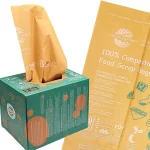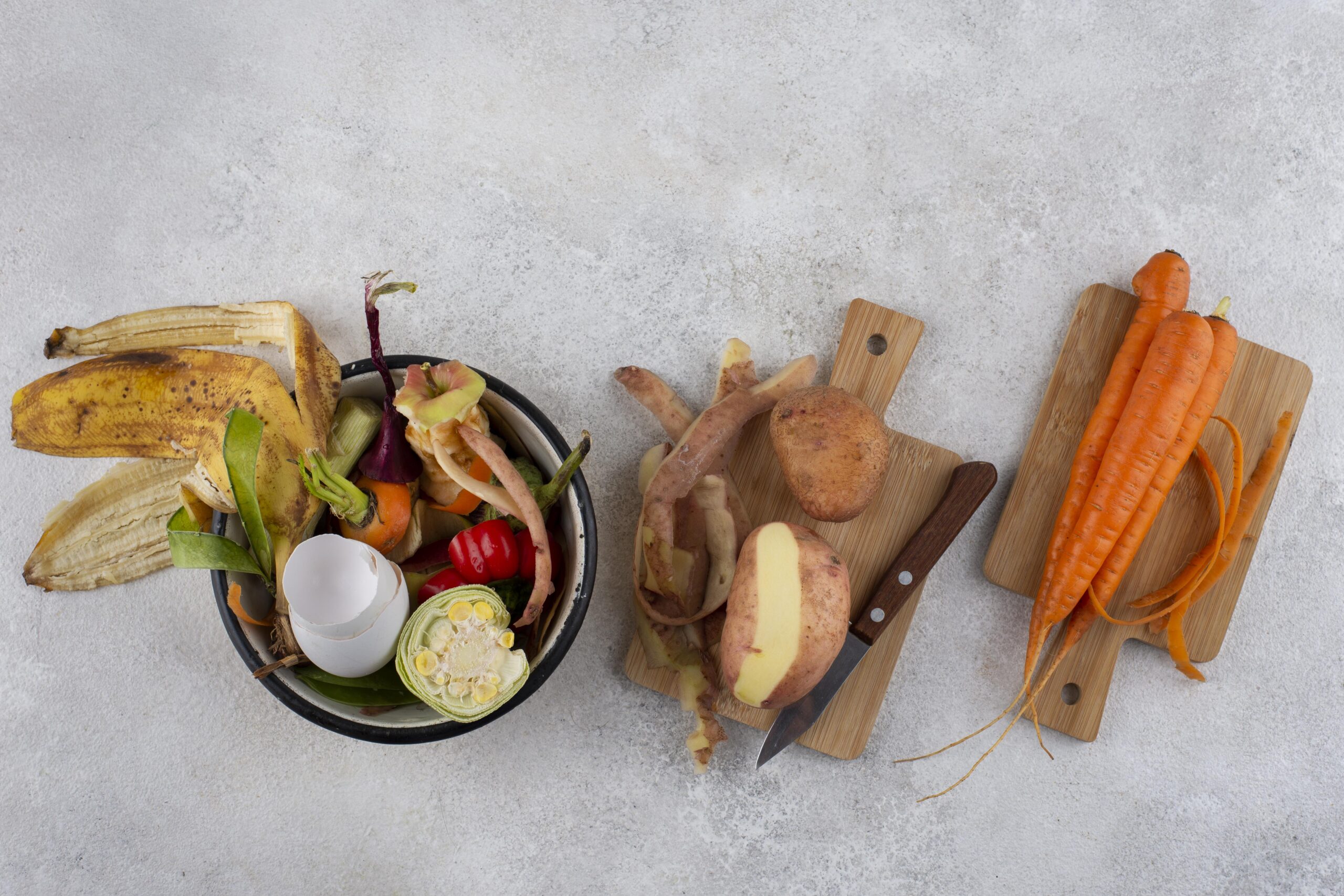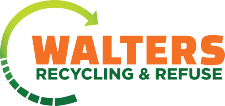Quick LInks
How to get started
Acceptable & Non-Acceptable Materials
Tips
FAQ’s
GUIDE TO GETTING STARTED

How to get started on Curbside Organics Recycling.
- Please contact Walters Recycling at (763) 780-8464 to get signed up for our curbside organics program. This step will alert the driver to look for your organic bag. We are charging a monthly fee for organics collection. It is a $10/month non-taxable fee. In addition, we also reduce your trash BASE rate by $3 a month as organics are non-taxable materials. With our curbside organics program, we have researched and tested BPI-certified bags that are strong enough to be co-collected with your garbage. This bag can only be found on Amazon.com and is the only brand we recommend for our curbside organics program. Ordering the bag directly from Amazon allows you the flexibility to place an order at your convenience and have them shipped directly to you.
- Order your bags from Amazon.com Moonygreen Compostable Bags 13 Gallon
- Select an indoor collection container. There are many options for containers you can use to collect organics recycling in your home – some you may already have. You can use an ice cream pail, coffee can, or cottage cheese container. You can convert an existing garbage can into an organics container. You can purchase a kitchen pail from a grocery, hardware, or retail store or order one online.
- Separate your food scraps, coffee grounds, paper towels, tissues, and other organics into a BPI-certified compostable bag in your home. Spoiled food and food scraps are the most common materials in the trash, which makes them the most essential material to start collecting for organics recycling. We have provided some additional tips or best practices below on how to set up your organics collection at home.
- On trash day, simply hand tie the 13-gallon BPI Certified Organics bag containing your household’s food waste and non-recyclable papers and place it on the top of the trash INSIDE your regular trash cart. We will pull all organic bags from other trash at the curb, put them in another container on the truck, and go off to a composting facility.

Organics Material
Acceptable + Non-Acceptable Materials
Here are a few lists of what should be collected and what should not.
Acceptable Organics Recycling
Food waste and food-soiled paper are called organic waste. It includes:
- Food Scraps
- Fruits & Vegetable scraps
- Meats, fish & bones
- Bread, pasta, & baked goods
- Spoiled leftovers
- Egg and nut shells
- Dairy products
- Tea leaves (staples removed)
- Coffee grounds
- Food-soiled paper products
- Paper towels & napkins
- Paper plates & cups (uncoated)
- Soiled Pizza boxes
- Paper Egg cartons
- Tea bags (staples removed)
- Coffee Filters
- Other Compostable Items
- Tissues & cotton balls
- Floral trimmings & house plants
- BPI-Certified materials
Non-Acceptable Materials for Organics
These items should not go into your organics bag
- Shredded Paper
- Plastics
- Plastic bags, twist ties
- Glass
- Metal
- Styrofoam
- Foil / Aluminum
- Straws
- Microwave Popcorn bags
- K-Cups from single serving Coffee
- Diapers or wipes
- Pet Droppings – Kitty Litter
- Feminine Hygiene products
- Cigarette butts
- Rocks or bricks
- Automobile & engine fluids
- Band-Aids or first aid items
- Batteries
- Candles or wax
- Candy or chip wrappers
- Rubber wine corks
- Gum
- Garden Trimmings or Yard waste
- Juice boxes or Pouches
- Chalk, crayons
- Markers & Pens
- Dusting wipes
- Detergents: (liquids, power, sheets or tablets)
- Butter or margin wrappers
- Paper Plates and cups (unless they are BPI certified)
- Waxed parchment paper
- Wax-coated paperboard packaging
- Take out or To go packaging (unless it’s BPI certified)
- Dryer Lint
- Cork
- Q-tips
- Frozen foods and refrigerated food packaging
Some Tips For Making Organics Collection Easier
Best practices for at-home organics collection. Discard your food waste and food-soiled paper from meals, your refrigerator, and the pantry into a kitchen compost bucket, separate from your other household trash. Use a kitchen scraps recycling setup that is most convenient for you and your household.
- Use a container with a vented lid. Vented containers allow moisture to evaporate, slowing down the decomposition process of the food in your organics recycling container. This will reduce odors and help your compostable plastic bags hold up longer. If you’re purchasing a container, look for one with a vented lid. If you’re making your own, poke holes in the lid.
- Remove liquids. Liquids in your organics recycling container can speed up the decomposition of food and weaken compostable bags. Drain excess liquids before placing food scraps in your collection container to avoid this. You can also place paper towels or newspaper at the bottom of your collection container to absorb liquids.
- Keep your container in the fridge or freezer. Keeping your collection container in the refrigerator or freezer slows the decomposition process, reduces odors, and prevents pests like fruit flies. It can also help your compostable bags last longer.
- Collect organics throughout your house. Although we generate the most organics recycling in the kitchen, there are opportunities to collect materials for organics recycling throughout the house. One idea for the bathroom: convert your bathroom trash container to an organics bin and clip a smaller cup to the bin to collect trash. Compostable items like tissues, Q-tips, and cotton balls go in the organics compartment, while garbage items like dental floss go in the smaller cup.

Frequently Asked Questions
A. Yes, It’s important that you notify us that you will be participating in the program. We will need to make adjustments to your account, one of which notifies the driver of your address and alerts them to look for your organics bag. In addition, there is a small reduction to your trash bill, as one third of the trash becomes non-taxable.
A. As soon as you’ve received your Organics bags, you may get started on the program! Remember to contact Walters Recycling first in order to have your stop identified in our system so your driver will know to look for your organics bag and pull it from your cart.
A: You should store them in a cool dry place. If you store them in a warm area like the garage in the summer time, the heat will shorten the life span of the bags.
A. Hand Tie the bag tightly (No twist ties) and simply place the bag on top of your trash INSIDE your trash cart, so it’s easy for our driver to remove it from your trash container on your service day.
A. No, we understand that there are several different bag options on the market and sold in big box stores as well as online however, those bags have also been tested in our curbside program and are not recommended or approved for our program because those bags are thin, brittle, and tend to rupture before you can get it from your home to the garbage cart or we can get them from the cart to our truck.
Do not bag your organics in Plastic bags. They are not BPI Certified and will not breakdown in the composting process. Plastic bags are a contaminant.
A. BPI certified is the certification process that compostable materials go through to show that they are compostable at an industrial composting facility. All BPI Certified items will have the BPI logo on the object or the box they come in.
The logo is:
![]()
A. The material accepted in curbside organics will be brought to a commercial processing facility, which means this program allows you to place meat, bones, dairy, compostable plastics and paper waste in your organics green bag. This material will break down in an industrial composting facility because of the heat that is generated in the composting process, approximately 150 degrees. Commercial compost facilities maintain their compost at higher temperatures than backyard compost bins, so you can include more materials. The higher temperatures kill bacteria and breakdown items that cannot be composted in a backyard system, including the meat, bones, citrus, dairy, and compostable plastics.
A. You should not have a problem with either item if you have not had a problem in the past. The waste that is being separated and collected is the same waste that was always being collected. We do recommend a 13 gallon trash can that has a lid to reduce any fruit flies that could come from fruit being purchased in the spring and summer time.
A. Please check out this composting article for more information.
A. No, Yard waste is not accepted in the organics bag or your garbage cart. It should still be collected from your yard and either composted in a backyard compost system, or simply give us a call to set up yard waste service 763.780.8464. The Organics bag is for only collecting your organic waste. For a detailed list of materials that are acceptable the section above.
A: REMEMBER: On trash day, simply hand tie the 13-gallon BPI Certified Organics bag containing your household’s food waste and non-recyclable papers and place it on the top of the trash INSIDE your regular trash cart. Our drivers are instructed to pull all Green Bag Organics from other trash at the curb and put it in another container on the truck and with your MSW will be taken to our transfer station. The organics will then be transferred to a state permitted industrial composting facility where it will be processed and turned into compost.
A. Organic material comprises about 30% of the average family’s trash. When this material is thrown in the trash, it ends up in a landfill where it takes up valuable space and contributes greenhouse gases. Similar to cans, bottles, and paper, you can transform organic waste into a valuable product by separating it out for recycling. Sorting organics out at home allows you to make something useful of your waste!

